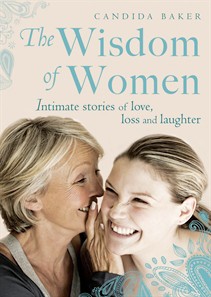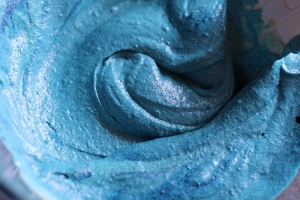Mother’s Secret Recipe
 She holds out the photo in its expensive silver frame.
She holds out the photo in its expensive silver frame.
‘I put this by Dad’s bed, in hospital, you know, when he started forgetting things.’
She is proud of this and getting the frame at a reduced price was a bonus.
I thought it would comfort him to see the family,’ she adds.
It’s a kind thing to do when a man is dying.
I take the photo from her hands.
Paul, the eldest, stands at the back and his arms hang by his side like strands of seaweed. Michelle stares straight ahead while Samantha, the peace-maker of the family, flashes her wide smile. Mum, so much smaller than the rest, stands next to Dad who towers over her.
The illness is there in Dad’s eyes but not his body — not yet.
I count the people in the photo.
Five, I count again to make sure.
My mother is busy tidying the shelves behind me.
‘I’m not in the photo,’ I state as plainly as I can.
She stops re-arranging the clean shelf and looks at the picture.
‘Yes, you are,’ she says. I pass her the frame and she peers at her family huddled together in the car park outside the restaurant. She keeps staring at the picture as if somehow I will emerge.
‘Look, five people,’ I move closer and my voice rises, ‘one, two, three, four, five.’
She stares harder.
‘I’m not in it,’ I say again. She puts the photo back on the shelf and sighs. I wait for her to say something but she moves across the study to wipe more ornaments.
A large, square photo of my father’s face sits in a glass frame on the desk. It’s the same picture that sat on his coffin at the funeral service.
Now it lives here in front of the computer where he spent most of his afternoons.
I’m puzzled by my mother’s choice – how could she choose this photo? It’s not deliberate, I know that, she’s been under a lot of stress with years of Dad’s illness and she’s tired.
But she’s always been tired.
After four children, she ran out of mothering and left my sisters to pick up the pieces.
Michelle resented it the most. Her seething anger towards me was thinly veiled on the few occasions the family came together.
‘You were so spoilt,’ she declared after copious amounts of scotch.
I never found an answer for her accusations and felt anything but spoilt.
My mother was busy, she had a house to clean and beautiful cakes to make.
Sweet blueberry crumble, crunchy apple tart, cheesecake, buttercream sponge, moist banana loaf; they all tasted delicious.
She liked nothing better than to retrieve her best white tablecloth from the linen cupboard in preparation for a spread.
Never just one, guests were treated to a feast of three or four cakes.
Yet when these feasts were over, everyone looked satisfied except my mother.
The guests had admired her cakes and stroked the fine china cups but when she cleaned up after they’d gone, she complained with a bitterness in her voice as sharp as the lemon icing on the carrot cake.
‘Who does Sophie think she is, and what about Annie, no wonder her husband isn’t interested in her the way she dresses . . .’
I sang inside my head to blot out the words. They were like poison spreading over the cake crumbs sitting on the empty plates.
As soon as I could, I sneaked outside and threw the ball to our dog, Rex, at the far end of the backyard.
‘How could you forget me?’ I say out loud.
She ignores the difficult question and heads into the kitchen.
‘I’ll make your favourite tonight,’ she announces,’ you know the fluffy omelette you like.’
This is all I’m going to get.
A special dinner and inane chatter about the neighbours and friends who have let her down, dressed inappropriately or offended her by not mowing their front lawns when she thought they should.
I take another look at the photo.
Nup, not there.
I turn and look at the photo of my father’s face.
We used to pretend to fight for the biggest slice of my mother’s latest baking creation or we stole pieces when she wasn’t looking.
‘Don’t tell your mother,’ he’d say in jest.
Her eyes shone when Dad and I argued over the last piece of apple strudel. She’d cut it in half and give Dad the bigger slice. He piled whipped cream on top and I copied him. We never seemed too full for more cake.
Since Dad died I’d lost my appetite for cakes.
When afternoon tea was served, I took a small slice and spent most of the time moving the cake around the plate until it looked misshapen enough to not draw attention to my lack of enthusiasm.
While Mum and Michelle ate and gossiped, I put on my ipod and blotted them out. They said I was rude.
‘I can’t hear you,’ I called through strains of the Rolling Stones.
Michelle nodded as Mum talked about the fat woman she’d seen at the mall, and how disgusting the woman looked in shorts.
I turned up the volume until their voices disappeared into the background.
I started to visit less, even though it was only two hours drive north on the Pacific Highway.
When my mother rang I pretended I was busy and could only talk for a moment. Her rant about the lady at the shops who gave her the wrong change was cut short.
‘I have to go Mum, the kids are calling.’
I edited myself so much around my mother that I forgot how to be her daughter.
She offered me recipes. Secret cake recipes, written in spidery scrawl in notebooks tied together with brown string.
Do you want to know how to make the chocolate biscuit cake? Aaah, the chocolate biscuit cake, the one with rum in it.
For years we had all begged her for the recipe.
That’d be great Mum, I lie, next time I come up, that’d be great.
It was a long time between visits. Samantha phoned and asked when I last saw Mum.
‘She says you’ve been busy,’ said the middle sister, who lived across two states.
‘I have,’ I say and I ask about the kids, her job and their next skiing trip.
When Michelle starts to call, it becomes tricky. Her accusations target my neglect and how I’ve never cared about Mum. She raves at me while I rearrange the fridge magnets.
This family I belong to holds no nourishment for me; it’s a pretense. I want to tell Michelle that but there’s little point.
Her idea of family bonding is shopping. She showers my mother with expensive perfumes and designer shoes. She bought Mum a dress for $780 to wear to Dad’s funeral.
Mum took it out of the wardrobe and showed me when I visited, it’s Channel, she said every time.
Love, according to my mother, is measured in gifts; the more costly the item, the more love it holds.
My homemade presents and photos of the kids were stashed at the back of the shelf. Or put in my mother’s drawer of unwanted gifts.
My bond to the family thins and I give up on the presents — and the cakes.
Months pass and the visits to my mother’s house are less frequent. It’s every second month now and my excuses become more feeble.
Our lives are distant and even though I hear repeats of the stories about her neighbours and the shocking things they’ve done, I don’t hear the words anymore.
‘Okay,’ I cut her off mid sentence, ‘I have to go, lots to do Mum.’
The distance becomes comfortable and we slip into half yearly visits and monthly telephone conversations. I rely on my sisters to occupy my mother’s loneliness as I struggle to be a good enough daughter by proxy.
*
On a bright Saturday morning, Nina is at a loose end. Her usual social life has become unhinged and she’s looking to me for entertainment.
‘Hey Mum, let’s make a cake.’
She’s excited and pulls old greasy tins out of a forgotten cupboard in the kitchen. The noise of metal on metal jars me and Nina senses my impatience.
‘I can do it on my own you know but then you can’t eat any,’ she says.
Relenting, I take the butter from the fridge so it can soften before its beating. Nina lines up jars of sultanas, chocolate bits and sugar.
She has a natural instinct for the ingredients but is unsure of the correct amounts.
‘Let’s ask Granny, she knows a lot about cakes,’ she says.
I cringe.
Nina jumps across the kitchen and grabs the phone.
There is excitement in her voice as she tells Granny about our domestic adventure. She barely leaves room for her grandmother to reply and is breathless when she gets off the phone and relays the instructions.
She gathers the mixing bowl and sifts the flour as she tells me some of Granny’s special secrets.
I cream the butter and sugar while Nina adds the choc chips. We work together like this with my mother’s baking wisdom between us. I laugh at how Nina interprets the advice and how she adds extra chocolate to the mixture.
‘Did Granny say to do that?’ I say.
‘No, but she didn’t say not do it,’ Nina says.
I laugh and together we pour, we mix, and then grease the tin before putting our masterpiece into an over-hot oven.
It’s a lumpy looking cake but neither of us, with our flushed cheeks from the warm kitchen, seem to care.
The phone rings and I pick it up. It’s my mother.
‘Yes, the cake is in,’ I say.
‘It doesn’t quite look like yours,’ I add.
‘You never were much of a cook,’ my mother says.
This is true.
‘No, I wasn’t,’ my voice is quiet.
There are no words left.
A slow silence hangs across the telephone like an empty washing line.
‘Mum.’
‘Uh-huh,’ she says.
‘Mum, I have to go.’
I lower the phone and rest the handset in its cradle.I stand right where I am and watch my daughter peer into the oven.
When the cake is cooked, we use bright blue food dye and make the most magnificent icing ever and smear it over the the top of the cake.
I make tea and we sit at the long, wooden table in the middle of the kitchen and sip our tea and eat warm, blue cake.
We lick the crumbs off the plate before we reach for a second piece.
© Susanna Freymark
First published in The Wisdom of Women, by Candida Baker, Allen & Unwin, 2012




